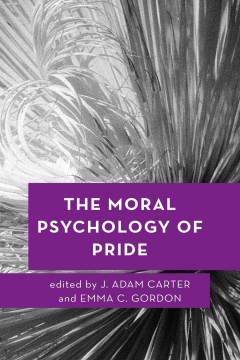
Additional Information
Book Details
Abstract
Is it good to be proud? We sometimes happily speak of being proud of our achievements, ethnicities and identities, yet pride is also often described as the most serious of the seven deadly sins. This edited collection of original essays examines pride from a variety of perspectives in philosophy, psychology, sociology and anthropology. The volume seeks to explore such topics as the nature of pride, its connection to other human emotions, whether it is a virtue or vice (or both), and what role it might play in both our intellectual and moral lives. Containing diverse voices and viewpoints, this book aims to illuminate the various and complex dimensions of pride.
This is a terrific and timely volume on pride. It addresses several key questions: Is pride a virtue or a vice? Can a person take pride in things she cannot control? Can she take pride in the accomplishments of other people? What does it mean to take pride in one’s race? What is intellectual pride? Chock-full of engaging examples, this volume will be delightful reading for students and researchers alike.
Heather Battaly, Professor of Philosophy at California State University, Fullerton
This exciting new collection, addressing some of the most pressing questions about the nature, psychology, epistemology and ethics of pride, illustrates the vitality and significance of work in moral psychology. It includes studies of pride and its relation to humility, self-respect, religion and politics that are destined to have a lasting influence on future debates about these topics.
Alessandra Tanesini, Professor of Philosophy at Cardiff University
Carter and Gordon have skilfully assembled an excellent resource for understanding and appraising pride – one of the most complex and contested components of our moral and intellectual lives. Typically maligned as vicious or sinful, this volume urges a more nuanced approach to understanding and appraising its many forms. The chapters draw widely on empirical psychology, virtue epistemology, Christian and Hindu religion, and liberatory social theory to examine how pride can both facilitate and corrupt our moral, social, and intellectual life.
Ian Kidd, Assistant Professor of Philosophy, University of Nottingham
Emma C. Gordon is a Research Fellow in Philosophy at the University of Edinburgh. She has published articles in Synthese, Bioethics, Philosophical Psychology, American Philosophical Quarterly and the Journal of Applied Philosophy.
J. Adam Carter is a Lecturer in Philosophy and Director of the COGITO Epistemology Group at the University of Glasgow. He is the author of Metaepistemology and Relativism (2016) and A Critical Introduction to Knowledge-How (with Ted Poston) and has published articles in Noûs, Philosophy and Phenomenological Research, Analysis, Philosophical Studies and the Australasian Journal of Philosophy.
Contributors: Michael Brady, Professor of Philosophy, University of Glasgow, UK; Eva Dadlez, Professor of Humanities and Philosophy, Central Oklahoma University, USA; Allan Hazlett, Assistant Professor of Philosophy, University of New Mexico, USA; Jesper Kallestrup, Professor of Philosophy, University of Edinburgh, UK; Antti Kauppinen, Academy of Finland Research Fellow, University of Tampere, Finland; Adam Morton, Visiting Emeritus Professor of Philosophy, University of British Columbia, Canada; Duncan Pritchard, Professor of Philosophy, University of Edinburgh, UK; Robert Roberts, Distinguished Professor of Ethics, Baylor University, USA; Neal Tognazzi, Assistant Professor of Philosophy, Western Washington University, USA; Kevin Timpe, Professor of Philosophy, Northwest Nazarene University, USA; Samantha Vice, Associate Professor of Philosophy, Rhodes University, South Africa; Ryan West, Graduate Student, Baylor University, USA; Lisa Williams, Senior Lecturer in Psychology, University of New South Wales, Australia
A timely addition to the academic literature, this is the most comprehensive and truly interdisciplinary collection available on the topic. A monumental contribution, a volume to be proud of.
Dr. Ian Church, Visiting Assistant Professor of Philosophy at Hillsdale College
Table of Contents
| Section Title | Page | Action | Price |
|---|---|---|---|
| The Moral Psychology of Pride | Cover | ||
| Contents | v | ||
| 1 The Moral Psychology of Pride: An Introduction | 1 | ||
| 2 The Appropriateness of Pride | 13 | ||
| 3 Pride versus Self-Respect | 31 | ||
| 4 Beyond the Self: Pride Felt in Relation to Others | 43 | ||
| 5 Intellectual Pride and Intellectual Humility | 69 | ||
| 6 Intellectual Pride | 79 | ||
| 7 Jesus and the Virtues of Pride | 99 | ||
| 8 Goal-Oriented Pride and Magnanimity | 123 | ||
| 9 Moral Pride: Benefits and Challenges of Experiencing and Expressing Pride in One’s Moral Achievements | 143 | ||
| 10 Pride, Achievement and Purpose | 169 | ||
| 11 White Pride | 191 | ||
| 12 Pride in Christian Philosophy and Theology | 211 | ||
| 13 The Practical Advantages of Pride and the Risks of Humility: The Defence of Pride Occasionally Found in the Work of David Hume and Jane Austen | 235 | ||
| Index | 249 | ||
| About the Editors and Contributors | 251 |
